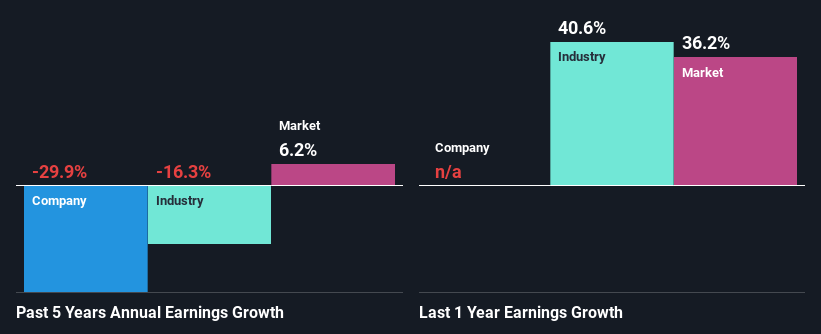Should Weakness in The Fulham Shore PLC's (LON:FUL) Stock Be Seen As A Sign That Market Will Correct The Share Price Given Decent Financials?
With its stock down 19% over the past three months, it is easy to disregard Fulham Shore (LON:FUL). However, the company's fundamentals look pretty decent, and long-term financials are usually aligned with future market price movements. Specifically, we decided to study Fulham Shore's ROE in this article.
ROE or return on equity is a useful tool to assess how effectively a company can generate returns on the investment it received from its shareholders. Simply put, it is used to assess the profitability of a company in relation to its equity capital.
View our latest analysis for Fulham Shore
How Is ROE Calculated?
The formula for return on equity is:
Return on Equity = Net Profit (from continuing operations) ÷ Shareholders' Equity
So, based on the above formula, the ROE for Fulham Shore is:
9.3% = UK£3.7m ÷ UK£39m (Based on the trailing twelve months to March 2022).
The 'return' is the yearly profit. That means that for every £1 worth of shareholders' equity, the company generated £0.09 in profit.
What Is The Relationship Between ROE And Earnings Growth?
So far, we've learned that ROE is a measure of a company's profitability. We now need to evaluate how much profit the company reinvests or "retains" for future growth which then gives us an idea about the growth potential of the company. Generally speaking, other things being equal, firms with a high return on equity and profit retention, have a higher growth rate than firms that don’t share these attributes.
Fulham Shore's Earnings Growth And 9.3% ROE
To begin with, Fulham Shore seems to have a respectable ROE. Yet, the fact that the company's ROE is lower than the industry average of 12% does temper our expectations. Further research shows that Fulham Shore's net income has shrunk at a rate of 30% over the last five years. Not to forget, the company does have a high ROE to begin with, just that it is lower than the industry average. Therefore, the shrinking earnings could be the result of other factors. For example, it could be that the company has a high payout ratio or the business has allocated capital poorly, for instance.
Furthermore, even when compared to the industry, which has been shrinking its earnings at a rate 16% in the same period, we found that Fulham Shore's performance is pretty disappointing, as it suggests that the company has been shrunk its earnings at a rate faster than the industry.
Earnings growth is an important metric to consider when valuing a stock. The investor should try to establish if the expected growth or decline in earnings, whichever the case may be, is priced in. By doing so, they will have an idea if the stock is headed into clear blue waters or if swampy waters await. Is Fulham Shore fairly valued compared to other companies? These 3 valuation measures might help you decide.
Is Fulham Shore Using Its Retained Earnings Effectively?
Fulham Shore doesn't pay any dividend, meaning that the company is keeping all of its profits, which makes us wonder why it is retaining its earnings if it can't use them to grow its business. It looks like there might be some other reasons to explain the lack in that respect. For example, the business could be in decline.
Summary
In total, it does look like Fulham Shore has some positive aspects to its business. Although, we are disappointed to see a lack of growth in earnings even in spite of a moderate ROE and and a high reinvestment rate. We believe that there might be some outside factors that could be having a negative impact on the business. Having said that, looking at current analyst estimates, we found that the company's earnings growth rate is expected to see a huge improvement. To know more about the company's future earnings growth forecasts take a look at this free report on analyst forecasts for the company to find out more.
Have feedback on this article? Concerned about the content? Get in touch with us directly. Alternatively, email editorial-team (at) simplywallst.com.
This article by Simply Wall St is general in nature. We provide commentary based on historical data and analyst forecasts only using an unbiased methodology and our articles are not intended to be financial advice. It does not constitute a recommendation to buy or sell any stock, and does not take account of your objectives, or your financial situation. We aim to bring you long-term focused analysis driven by fundamental data. Note that our analysis may not factor in the latest price-sensitive company announcements or qualitative material. Simply Wall St has no position in any stocks mentioned.
Join A Paid User Research Session
You’ll receive a US$30 Amazon Gift card for 1 hour of your time while helping us build better investing tools for the individual investors like yourself. Sign up here

 Yahoo Finance
Yahoo Finance 
